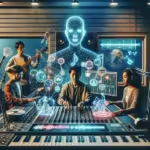Revolutionizing the Music Industry: The Rise of Generative AI
The music industry is on the brink of a significant transformation, driven by the surging development and application of generative artificial intelligence (AI). A recent strategic business report projects that the market for generative AI in music will grow by an astounding $2.375 billion between 2024 and 2030. This leap is more than just a financial statistic; it marks the dawn of new experimental music genres and the evolution of algorithmic soundscaping. As technology continues to intertwine with creativity, generative AI is set to redefine musical boundaries and open a host of opportunities for artists, producers, and listeners alike.
The Role of Generative AI in Music Creation
Generative AI refers to the use of algorithms to create new music content, either from scratch or by adapting existing works. This cutting-edge technology presents various approaches to music making, from composing novel melodies to developing complex soundscapes that were once unimaginable. Here’s how AI is reshaping musical creativity:
- Composition: AI systems can generate original compositions by analyzing vast datasets of existing music, learning patterns, and applying them in innovative ways.
- Style Mimicking: Musicians can leverage AI to replicate styles of famous artists, enabling the creation of music in the likeness of renowned genres or inventing new ones entirely.
- Collaboration: AI enables unprecedented collaborations between human and machine, allowing musicians to experiment with sounds and compositions not previously within their reach.
Innovation in Soundscapes and Genres
One of the most exciting prospects of generative AI is its potential to innovate soundscapes and create experimental music genres. AI systems can manipulate audio in nuanced ways, producing sound experiences that challenge conventional musical structures:
- Algorithmic Soundscaping: AI enables the creation of complex, layered auditory environments through algorithmically generated sounds. This trend is growing rapidly in ambient and electronic music genres.
- Genre Fusion: AI facilitates seamless blending of different musical styles, leading to the emergence of entirely new genres. This ability to cross traditional boundaries encourages musical evolution and diversity.
Market Growth and Opportunities
The forecasted growth for generative AI in music underscores the burgeoning opportunities within this field. As the technology matures, its impact is expected to ripple across various facets of the industry:
- Accessibility for Emerging Artists: Generative AI tools democratize music creation by lowering barriers to entry, offering aspiring artists access to sophisticated music-making resources without the need for high-level technical skills or expensive equipment.
- Enhanced Consumer Experience: For listeners, the result is a richer and more diverse musical landscape. Personalized playlists, interactive music, and responsive soundtracks that change based on listener inputs are just a few innovations that promise to enhance consumer engagement.
- Revenue Streams for Music Platforms: Streaming services and music platforms stand to benefit significantly from integrating AI-driven features, offering unique content and interactive experiences that could drive subscription and ad revenues.
Challenges and Considerations
Despite its promising potential, generative AI in music also faces challenges that need addressing. Here are some considerations for stakeholders:
- Intellectual Property: As AI-generated music gains prominence, questions around copyright and ownership become more complex. Creators, producers, and legal experts must navigate these murky waters to ensure fair compensation and recognition.
- Quality vs. Quantity: With AI’s ability to crank out a large volume of music quickly, there is a risk that quantity can overshadow quality. This necessitates maintaining artistic integrity and ensuring that AI-produced music resonates on a human level.
- Resistance to Change: The traditional music community may exhibit resistance towards AI-driven processes, fearing the erosion of human creativity. Addressing these concerns requires educating stakeholders about AI as a tool, rather than a replacement, for human artistry.
The Future of Music with Generative AI
The future of music, interlaced with generative AI, is full of promise. As the technology expands, it will bring about shifts that are both subtle and profound in how we create, engage with, and consume music. Visionary artists and forward-thinking companies are already leaning into AI’s capabilities, crafting a new era of music that blurs the lines between human and machine.
Looking ahead, it is essential for both creators and consumers to embrace the opportunities that generative AI offers. By doing so, we not only prepare for a future where music is more dynamic and inclusive but also celebrate a frontier of creativity that reveals unexpected beauty through algorithmic collaboration. In the coming years, the music industry will continue to evolve, propelled by the harmonious symphony of technology and talent working in concert to redefine musical expression.








